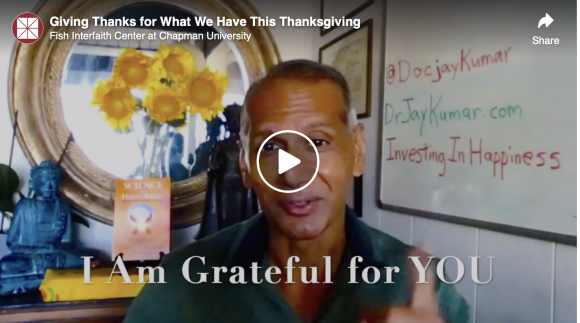Giving Thanks for What We Have Thanksgiving Blessings from The Fish Interfaith Center
November 25, 2020
As we celebrate the Thanksgiving holidays, I’d like to share a personal mantra with you that I find to be true: In order to enjoy a future of abundance and happiness, you need to express gratitude for what you have in the present.
Enjoy our “Tips for a Happy Thanksgiving” video
For many of our Chapman community, Thanksgiving this year may be different than previous ones. If for any reason you find yourself unable to celebrate the holiday enjoying the traditional feast with loved ones this year—or even if you’re struggling to make ends meet—it’s okay to feel frustrated, sad, or scared.
But, what if for this year’s Thanksgiving, we can learn to turn our anxiety into awareness?
As the word “Thanksgiving” implies, the significance of this holiday is to give thanks for what we have. It’s about expressing the proverbial “attitude of gratitude”—an idea advanced by timeless spiritual wisdom and recently affirmed by science.
The Science and Spirituality Behind Gratitude
So, how exactly does gratitude make us happy and healthy? How can learning to give thanks be key for our well-being?
Research now recognizes how gratitude is one of the most powerful and healthiest of human emotions. Studies at University of Miami, UC David, and other universities successfully demonstrate that remembering to be grateful for what we have in life can greatly outweigh any sadness, stress or challenges we might currently experience. In fact, new studies into the brain show that gratitude is one of the easiest and healthiest ways to experience overall wellbeing.
A 2009 study by the National Institutes of Health observed that brain scans of participants who expressed the emotion of gratitude—versus those in the control group that did not—experienced more activity in the brain’s hypothalamus. An active hypothalamus is helpful since it regulates sleep, digestion, and metabolism. More importantly, the study concluded that people who regularly express gratitude are less susceptible to anxiety and stress.
Here’s another way of looking at it. Gratitude is also a fundamental tenet revealed by religion. Ancient Scriptures throughout the world’s faith traditions have in some way taught us the sacred power of gratitude and the importance in giving thanks. Whether it’s in the form of prayer, penance, honoring the deceased, rituals, sacred feasts, or contemplative practices, gratitude is a universal feature among the religious traditions of humanity.
Practicing gratitude and giving thanks underscore the ethical and moral principles of our human nature. Despite the challenges and hardships endured in life, learning to be grateful for what we have encourages us to weave the sacred thread that unites Creator, our fellow humans, and all of creation into a single sacred web.
Make Gratitude Contagious
Despite the circumstances that life throws to us, when we express gratitude it’s as if our brain steps on the “emotional brakes” on the negative thoughts that bombard our mind. Suddenly, the emotions of sadness, self-pity or stress—that were driving us into anxiety or overwhelm—are slowed and enable us to cope with stressful situations and be more resilient in the face of challenges.
By reminding yourself of all that you’re grateful for in life, it does something remarkable for your brain—it tricks it into focusing on the positive, and dwelling less on the negative.
Gratitude also has a powerful social benefit. It helps us to feel more connected to others. Just saying the simple words “thank you” can lift us out of our own individual concerns and serve to remind us of the joy and happiness that others bring to in our life. Expressing gratitude not only benefits the recipient of our appreciation, but oneself.
A second reason to pause and express gratitude is that even simple expressions of gratitude can have long-lasting effects on those who receive them. When people feel valued, they are more likely to help others.
Just as we lift weights to build muscle, brain science affirms that our brain is a muscle that can be trained and developed. As we cultivate gratitude, we automatically experience greater enthusiasm and contentment.
Try it out for yourself. Say “thank you” to five different people every day for five consecutive days. Embody a genuine feeling of gratitude as you do so, perhaps even offering a smile to that person. After the fifth day notice how you feel. Chances are, you’ll experience a remarkable boost of inner happiness.
Start a Gratitude Practice
What’s one thing you’re grateful for that happened to you today?
In the Chapman “Happiness” course I’ve been teaching for the past decade, students perform a variety of “gratitude-building” exercises throughout the semester. Here’s one simple and easy-to-use gratitude tool that you can incorporate into your daily regimen and even start this Thanksgiving.
- Jot down on a sticky note three to five things for which you are grateful.
- Notice if there are any you take for granted.
- Write two or three more post-it notes with the same or different items and place each one someplace where they are visible throughout your day. The more places the better.
This Thanksgiving I personally give thanks to my health and well-being during this pandemic. Having a loving family and steadfast friends is a continuous source of my gratitude. Lastly, I’m so blessed to be teaching and working at Chapman, where I’m supported by such an amazing community.
Most of all, it’s important to remember that happiness isn’t a promise; it’s a practice! One proven and practical strategy for achieving emotional, mental, physical, and spiritual well-being is to practice gratitude.
From all of us at the Fish Interfaith Center, we wish you a sacred and safe Thanksgiving, Panthers!
Dr. Jay Kumar
Director, Contemplative Practices & Well-being, Fish Interfaith Center
Connect with us:
Blog https://blogs.chapman.edu/fish/
Email interfaith@chapman.edu
FB/IG – @Fishinterfaith
Twitter – @CU_Interfaith


